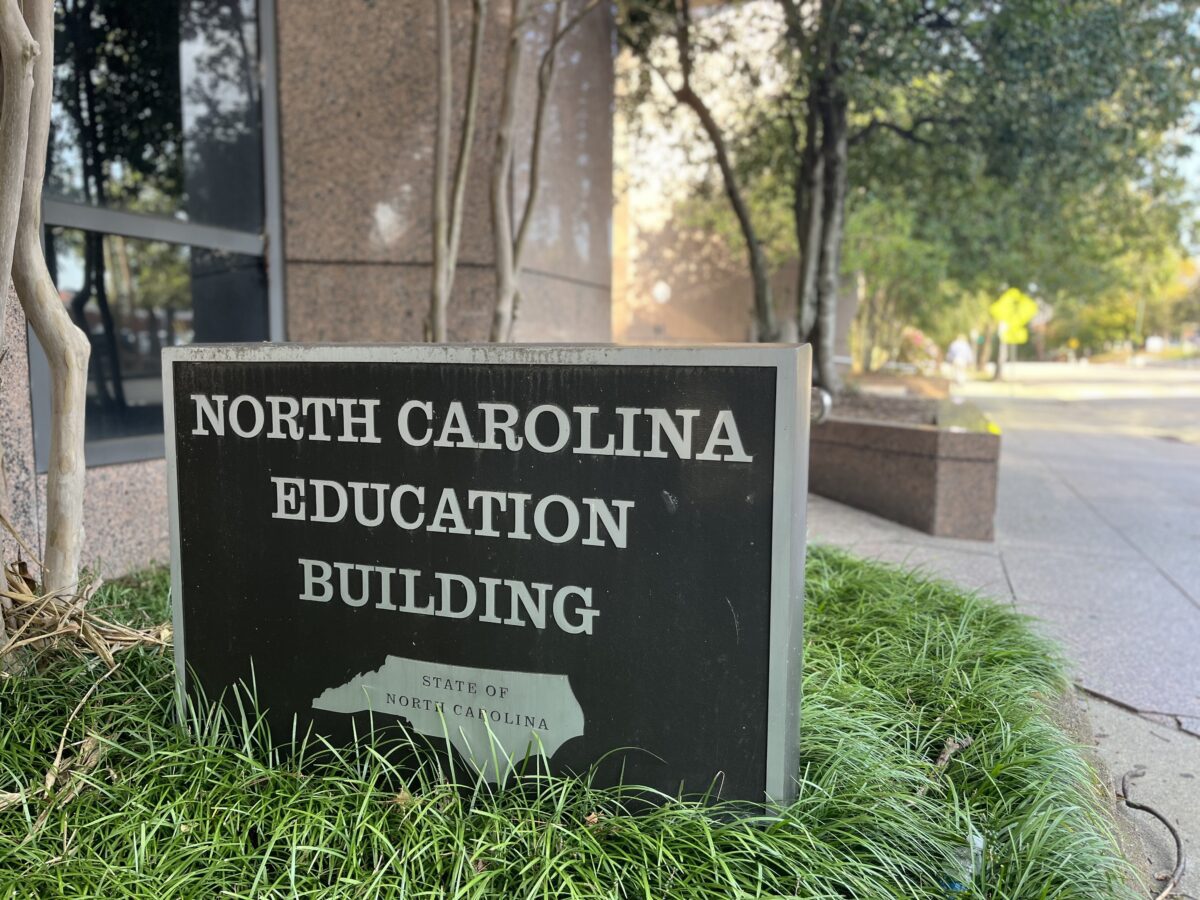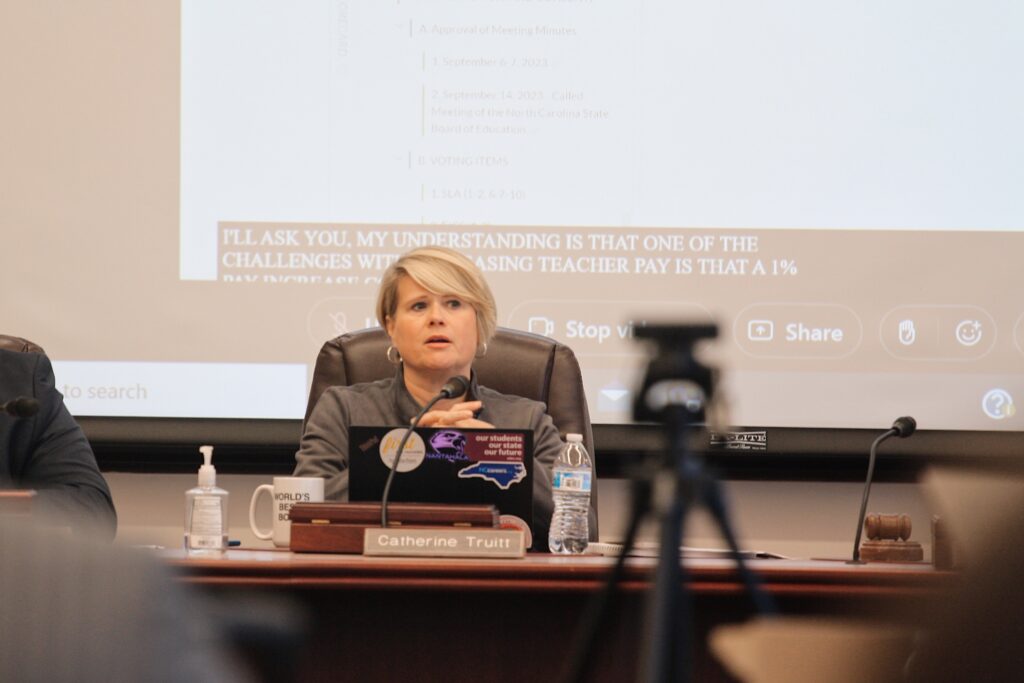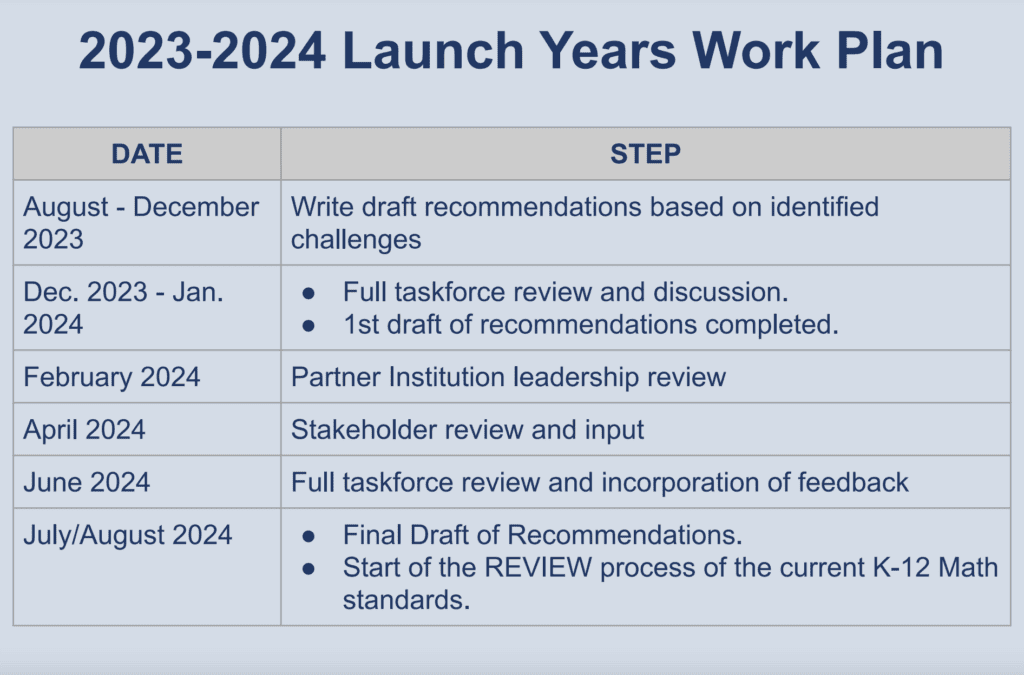![]()
Republish our articles for free, online or in print, under a Creative Commons license.
Close window XEdNC is a nonprofit, online, daily, independent newspaper. All of EdNC’s content is open source and free to republish. Please use the following guidelines when republishing our content.
Please email Anna Pogarcic at [email protected] if you have any questions.
by Hannah Vinueza McClellan, EducationNC
November 6, 2023

The entrance to the North Carolina Education Building, where the N.C. Department of Public Instruction (DPI) is housed. Hannah McClellan/EducationNC
The State Board of Education continued its efforts to implement policy items from the new budget on Thursday, including passing new rules for a policy set to go into effect during the 2024-25 school year that will allow high school juniors to graduate early.
The budget required the State Board of Education to create a three-year graduation track for high school students by Nov. 1. That track consists of 22 credits, and must receive parental consent.
The budget currently states that “local boards of education shall offer a sequence of courses in accordance” with that minimum requirement. Many schools already allow early graduation pathways for some students, but most schools typically require 28 credits for graduation.
Many education leaders worried the budget’s provision will prevent them from requiring more than 22 credits for any students.
“That of course, caused a lot of outcry from our school districts,” Sneha Shah-Coltrane, director of advanced learning and gifted education at the Department of Public Instruction (DPI), said at the Board’s October meeting. “As a result, we are very grateful that we are working with the General Assembly on some technical corrections, to be able to move forward with a reasonable, different approach.”
On Oct. 25, the General Assembly adjourned from the long session, to meet once a month starting on Nov. 29 to consider a limited number of items. A draft technical corrections budget bill would have moved the Nov. 1 deadline to Feb. 15, 2024. That bill does not currently address DPI’s other concerns.
Sen. Michael Lee, R-New Hanover, said that he “is working with the State Board of Education and Superintendent Truitt to address their concerns about the early graduation sequence during the short session,” the News & Observer reported. The short session starts on April 24.
In the meantime, the Board adopted an emergency rule regarding a three year-graduation track. Under the new policy, the Board no longer grants “clear and specific authority to local boards of education” to exceed the 22 credits required.
“This does eliminate for the ‘24-25 school year the rights of local boards of education to exceed the State Board of Education’s minimum requirements as it is currently in legislation, as well as permit students to graduate early,” Shah-Coltrane said. “For the time being, we feel this is responsive to the legislation and as reasonable as we can be.”
Per the policy, local boards “may provide recommendations for additional requirements.”
DPI and the Board hope a technical corrections bill will be in place before the law goes into effect, in order to allow local school boards to require more than 22 credits for students who do not opt to graduate early.
Until then, here are the guidelines for the early graduation process, as outlined in the new policy:
According to the budget, local school districts must begin advising students of the early graduation track and process during the 2023-24 school year.
Students who successfully opt to graduate early — and who also seek a degree, diploma, or certificate at an eligible postsecondary institution — will be eligible for “early graduate scholarships” based on financial need. Read more starting on page 194 of the budget.
“This is just another step toward recognizing that the nature of school and work is changing before our very eyes,” state Superintendent Catherine Truitt said in October. “I think it is a very small percentage of students for who it is right to stop at 22 (credits) — this may continue to grow as more and more options become available to students — but what I really like is that this policy requires parent buy-in for this happen.”

The Board discussed several other budget items at its meeting this week, including the “Parents’ Bill of Rights” and new computer science requirements.
Session Law 2023-106, known as the “Parents’ Bill of Rights,” became law on Aug. 16, after the General Assembly overrode Gov. Roy Cooper’s veto of the bill. At the time, Truitt said school districts needed more time to meet requirements of the new law, asking lawmakers to bump the effective date from Sept. 15 to Jan. 1.
The new budget granted that extension for much of the law. The budget also clarified that parents will not need to be notified or to provide their consent when school personnel act in a medical emergency.
The law bans curriculum on gender identity, sexual activity, or sexuality in kindergarten through fourth grade. It also requires schools to notify a parent about their child’s physical and mental health, including any school health care services they use, changes to their well-being, or requests to change a student’s pronouns.
The law also allows parents to review all curriculum and establishes remedies and timelines for parental concerns. Under that provision, the law mandates that school governing bodies adopt procedures for parents to notify principals regarding concerns about curriculum. A process to resolve concerns should take place within seven days of the date of notification by the parent.
After 30 days, “the public school unit shall provide a statement of the reasons for not resolving the concern.” At that point, parents can also request a “parental concerning hearing” with the State Board of Education.
Board leaders had previously spoken out about the provision, saying the hearings “will likely be a frustrating exercise in futility for all involved” and a “significant expenditure of resources.”
On Thursday, the Board approved a new policy regarding such hearings, first discussed last month.
Under the policy, parents can only request a hearing with the Board under limited circumstances. One set of circumstances include the failure of a child’s school to adopt and implement policies to notify parents about the following items:
Parents can also also seeks hearings with the Board about the existence of the following procedures or practices at their child’s school:
Notably, that list does not include book challenges, which must be handled at the local level.
Parents can request a hearing about the above items after notifying the principal of their child’s school, if the school has not resolved the concerns within 30 days. The form to submit a hearing request will be on DPI’s website starting in January 2024.
Under the new policy, the Board will appoint a hearing officer for each case who is a member of the North Carolina State Bar and has experience in education and administrative law in the last five years. The public school must pay for the costs of that hearing officer, who would then hold a hearing and submit a recommended decision to the Board within 30 days after their appointment.
“At the next regularly scheduled State Board meeting, held more than seven days after receipt of the recommended decision, the State Board shall vote to either approve, reject, or amend the hearing officer’s recommended decision,” the draft policy says.
Read the full policy and the emergency rule under the Board’s agenda items.
In line with the Parents’ Bill of Rights, DPI also recommended the State Board mandate the creation of a “Parent’s Guide to Student Achievement” in each school district.
Under the policy, set to come before the Board for a vote in December, school districts shall develop and distribute a parents guide at the start of each school year.
Among other things, that guide should address the following topics:
The guide must be provided in writing to the parent, in print and electronic versions, and be discussed at the beginning of the school year “in meetings of students, parents, and teachers.”
School districts must report to DPI by Sept. 15 each year, including a link to the parent’s guide and data reporting on parental hearings, among other things. DPI will provide the reporting form by May 15 “to support completion prior to the end of the school year.”
Shah-Coltrane said DPI is working to put together a database of information that districts could use to help create such a guide.
“It’s a big lift for our districts, but we do feel confident that a majority of this information has already been out there in our districts,” she said. “So it’s just a matter of putting it together.”

Under Session Law 2023-132, the State Board of Education must require “a passing grade in a computer science course” for graduation, starting with ninth graders in the 2026-27 school year. School districts can participate starting with the 2024-25 school year.
Students enrolling in a N.C. public high school after completion of 11th grade will be exempt from the requirement, per the law, along with “any student whose individualized education program states that the student’s disability would prevent the student from completing that graduation requirement.”
The initiative was championed by DPI and Truitt during the long session.
“By adding computer science to our graduation requirements, we are ensuring that students gain first-hand experience in this ever-growing discipline so that they can be better prepared to pursue the postsecondary plan of their choice,” Truitt said in a DPI release. “I commend the General Assembly for taking this tremendous step forward in terms of modernizing education in North Carolina so that we can equip students with the skills required of 21st century graduates.”
Under the law, computer science will be added to the English, math, arts, science, and social studies requirements for high school graduation in North Carolina. In order to add the requirement, the number of electives required will be reduced by one.
North Carolina will be the eighth state to require a computer science course upon graduation, per DPI.
The law directs the Board to include computer science instruction in the standard course of study for middle and high school students. Per the law, the Board had to adopt a list of approved computer science courses by Nov. 1, and needs to approve introductory computer science courses by Jan. 1.
The draft final course list includes 82 eligible courses. You can view that list here.
Truitt said DPI is being intentional about how to help small districts in particular implement these requirements well. She also said that DPI is already working on its legislative requests for the short session, which will include professional development for middle school teachers in math and literacy.
DPI is working on “a comprehensive math reform package” to bring to the Board in the new year in time for the legislative short session.
That package, which was presented to the Board this week, will include:
The changes are meant to better prepare all students for the Math 1 course, which some students take in middle school, but many take in high school.
“Most kids are not proficient in Math 1, or Algebra 1 as other places might call it,” Truitt said. “But we know that is the gateway for secondary success, and with the number of jobs that are available now and coming down the pipe in AI, machine learning, computer science — Algebra 1 is going to be the gateway to those career fields.”
The reform package is also meant to encourage more student interest in math — and to build confidence for others. On Wednesday, several Board members cited the lack of women and people of color in math fields.
“Math is for everyone,” said Deputy State Superintendent Michael Maher. “It’s not just for certain people. It’s not just for kids going to college.”
Current math standards were implemented in the following stages, after N.C. public schools began teaching math using Common Core standards in 2012:
K-12 Math standards are set to be reviewed in the 2024-25 school year, which several Board members said felt like perfect timing. Any recommendations for revising the standards will go to the Board in the summer of 2025.

On Tuesday, DPI announced that 16 North Carolina public school districts have been selected to join the North Carolina Recovery Practitioners Network — a new partnership between DPI, the University of North Carolina at Chapel Hill School of Education, NC Collaboratory, Harvard University, and Georgetown University.
The partnership is meant to provide opportunities for building capacity for research and evaluation with local leaders.
“Pandemic recovery must be rooted in thorough research. The NC Recovery Practitioners Network will give these districts access to unique resources and research as they join with our university partners,” Truitt said in a DPI release. “Utilizing evidence-based decision making is the best way to ensure our students are receiving support that is proven to move the needle on pandemic recovery.”
Over the next few months, the districts will participate in five workshops and receive regular coaching meetings with faculty partners. By the summer of 2024, the release says, “districts will develop a recovery-focused intervention and evaluation plan that outlines how to collect and analyze data to answer guiding questions, generate key findings for all areas of focus, develop and prioritize recommendations and communicate and sustain the work.”
District leaders and faculty partners will finalize and submit for funding to implement the study plan during the 2024-26 academic years. The network, which received $450,000 in COVID-19 relief funds and $500,000 from N.C. Collaboratory, is actively recruiting partners from around the state to “work alongside school district leaders to build capacity for using data and research to guide local investments in interventions aligned to their local context.”
“North Carolina is home to so many institutes of higher learning, and we’re excited to be able to tap into the wealth of knowledge that they bring to the table,” said Jeni Corn, DPI’s director of research and evaluation. “The NC Recovery Practitioner Network provides an exciting opportunity for school districts across the state to continue their recovery from the learning loss of the COVID-19 pandemic based on evidence and research-based practices.”
The 16 districts are: Cabarrus County Schools, Caldwell County Schools, Chatham County Schools, Cleveland County Schools, Cumberland County Schools, Edenton-Chowan Public Schools, Guilford County Schools, Harnett County Schools, Iredell-Statesville School District, Mooresville Graded School District, Pender County Schools, Rockingham County Schools, Rowan-Salisbury School System, Union County Public Schools, Wake County Public School System, and Winston-Salem/Forsyth County Schools.
The Board also approved the report to the General Assembly, “High School Diploma Endorsements and CTE Credentials,” in its consent agenda on Thursday.
Per state law, the Board established three high school diploma endorsements in 2013 “to encourage students to provide a more comprehensive student profile indicating credentials and rigorous pathway of study upon graduating from high school, to obtain requisite job skills, and to reduce the need for remedial education in institutions of higher education.”
The three legislated high school diploma endorsements are: Career, College, and College/UNC. The endorsements were established in collaboration with the N.C. Community College System (NCCCS) and the UNC System.
In 2018-19, DPI implemented a then-new legislative requirement to add the benchmark reading score for students to receive high school diploma endorsements.
“Due to the addition of this requirement, diploma endorsements have remained lower since the 2018-2019 school year,” the DPI agenda item says. However, “the most important takeaway from this report is that there was an increase in all areas of endorsements” from last year.
Here are some highlights from the report.
During the 2022-23 school year, 207,776 students earned 325,784 individual industry-recognized credentials. According to the report, additional in-depth details concerning the credentials earned will be shared in the teacher credential bonus report in February.
Community college Career and Technical Education (CTE) credits through Career and College Promise (CCP) were earned by 35,612 students across 191 Public School Units (PSUs), which include school districts and charter schools.
You can view a breakdown of the number of 2022-23 graduates who earned the career endorsement by district on page 23-28 of the report.

The Board also received a presentation on the 2022-23 N.C. Virtual Public Schools (NCVPS) Annual Report to the General Assembly.
The NCVPS has been in operation since 2007 and has served “767,815 student enrollments” since then, the report says.
During the 2022-23 school year, the NCVPS instructed “over 52,820 student enrollments from approximately 31,609 students.”
The school offered four new courses — including discrete mathematics for computer science — and developed nine new courses.
You can view the full report on NCVPS’ website.
Finally, the Board also approved its annual report to the General Assembly on low-performing districts and schools.
State law defines low-performing schools as those that receive a school performance grade of a D or F and a school growth score of “met expected growth” or “not met expected growth.” A low-performing school district is defined as a district in which the majority of the schools are low-performing. Stay tuned for a deep dive into the report.
The full Board meets next on Dec. 6-7 in Raleigh.